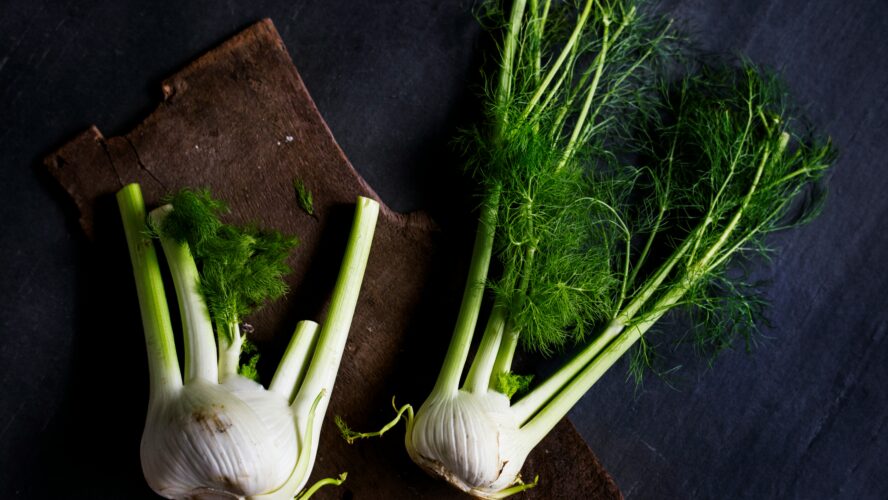Fennel
An ode to fennel: everything you need to know.

Prepare to call yourself a fennel expert. Here’s everything you need to know about this versatile bulb with it’s slight licorice flavor (but in the best way). Much like an herb, you can add it to dishes for a punch of flavor, or it can stand up to being the star of a salad.
Table of contents
Season for Fennel
Fennel is in season between May and October.
Never miss a new recipe. Sign up for our newsletter for more sweets, sips, and eats ideas along with well-researched, non-toxic living guidance and smart wellness advice.
Fennel Described
We think fennel is a highly misunderstood vegetable – no doubt in part because of its false association as “anise” – but once experimented with, you’ll find the mild, aromatic and unique nature of fennel are worth revering, as the ancient Greeks and Romans did for its medicinal and culinary properties.
Fennel is composed of a white or light green bulb with onion-like layers from which closely arranged stalks emanate, resembling celery (and they can be used like celery in any recipe!). The stalks are topped with feathery herbaceous greens near which flowers grow and produce fennel seeds. And, any and all of these parts are edible! Dried wild fennel pollen is a gourmet secret spice we just let you in on.
How to Buy and Store Fennel
Make your fennel selection for size; larger fennel bulbs are often more tender than slender, elongated ones, and provide more fodder for your recipes. Also, look for those that have glossy bulbs with no sign of cracking, bruising or browning – and, if the stalks are attached, the greens should be a bright, vibrant and crisp green. You can refrigerate unwashed and wrapped fennel for up to 5 days, but use your fennel as quickly as possible, for it tends to gradually lose its flavor. And dried fennel seeds can be stored with your other spices for about six months, though they’ll last longer if kept in the fridge.
How to Cook Fennel
Fennel can be your veggie equivalent into the exploration of nose-to-tail eating; every part edible. Both the bulb and stems can be eaten raw in salads, adding a crisp and crunch and refreshingly clean flavor. In terms of cooked, fennel does well braised, sautéed or as a soup’s accoutrement. We love the element chopped fennel adds to our vegetable stews! The fragrant greenery can be used as a beautiful garnish or like a fresh herb, adding flavor at the end of your cooking process. When slow-cooked, fennel’s distinctive flavor mellows, and it becomes succulently soft, practically melting in your mouth.
Health Benefits of Fennel
You’ll find fennel extract is used to treat a number of conditions including anemia, indigestion, flatulence, constipation, colic, diarrhea, respiratory disorders, menstrual disorders and eye care. But eating fennel aids your health all on its own. It contains, fiber, folate and potassium to protect your cardiovascular and colon health, a unique combination of phytonutrients with antioxidant, anti-inflammatory and anti-cancer properties and vitamin C to support your immune system, among other things. The Greeks and Romans knew what they were revering!
Why Buy Natural and Organic Fennel
Fennel is not included in the Environmental Working Group’s report as one of the 12 foods most frequently containing pesticide residues. In fact, historically fennel was placed on the ground to ward off insects in the home. That said, when you purchase your fennel organically, you are supporting sustainable practices and those farmers who take your health to heart.

